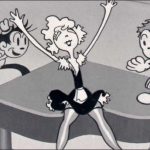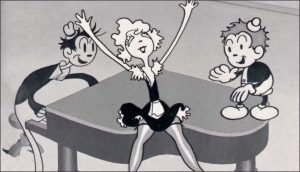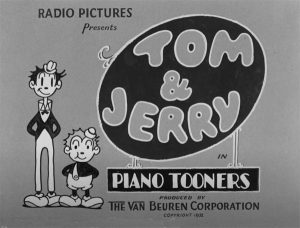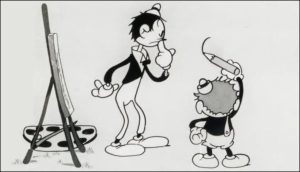Van Beuren Music 1932-33

 The 1932-33 season was very good for RKO Pictures. During that time, they were able to draw crowds, with a fantastic display of stop-motion animation (“King Kong”), and audiences who could still afford to go to the movies regularly were treated to such features as Professional Sweetheart with Ginger Rogers. Even RKO’s short subject division would earn them an Oscar with So This Is Harris, starring Phil Harris, who would also provide them with a feature, Melody Cruise. Again, things remained status quo with animation output, with quota still satisfied with output divided between Tom and Jerry and Fables, and for the moment, the executives were in too good a mood to be dissatisfied.
The 1932-33 season was very good for RKO Pictures. During that time, they were able to draw crowds, with a fantastic display of stop-motion animation (“King Kong”), and audiences who could still afford to go to the movies regularly were treated to such features as Professional Sweetheart with Ginger Rogers. Even RKO’s short subject division would earn them an Oscar with So This Is Harris, starring Phil Harris, who would also provide them with a feature, Melody Cruise. Again, things remained status quo with animation output, with quota still satisfied with output divided between Tom and Jerry and Fables, and for the moment, the executives were in too good a mood to be dissatisfied.
Down In Dixie (9/23/32) – A cheater, with nearly half the animation reused from the Uncle Tom’s Cabin spoof, Dixie Days, from 1930. Only the ending sequences get changed, having the entire cast somehow wind up at the North Pole. Newcomer song is “Lawd, You Made the Night Too Long”, a 1932 bombastic pop song, recorded by Louis Armstrong, for concurrent issue on Okeh and Columbia (the Okeh label being on the verge of being phased out for several years). Paul Whiteman got it for Victor. Lee Morse performed a vocal version for Victor. An all-star performance was issued on a 12″ format, featuring Bing Crosby, the Boswell Sisters, and Don Redman’s Orchestra on Brunswick. Guy Lombardo got the standard Brunswick issue for conventional 10″ size (below). The High Steppers (a house band) performed it on Crown. Andy Sanella issued it for 15-cent Hit Of The Week. It was later parodied in the 1940’s by Ziggy Talent with the Vaughn Monroe Orchestra with a new lyric, “Sam, You Made the Pants Too Long”, on Bluebird. Barbra Streisand would revive the parody in stereo for Columbia in the 1950’s. “Old Folks at Home” also makes a reappearance.
A Catfish Romance (10/7/32) – A female catfish, who looks and sounds suspiciously like the earlier Farmerette with fins, meets a feline fisherman who has been dragged into the water by his fishing line. When she finds out he hasn’t been catching anything, she suggests, “Well, why don’t you catch me?”, playing a lover’s game as she leads him on a merry chase. An octopus horns in, grabbing the girl, but succumbs to a duel with the male cat in the same manner as so many Terry or Foster spiders. The lovers end in the usual tryst. Songs: “I Can’t Give You Anything But Love, Baby”, originally written in 1927 by Dorothy Fields and Jimmy McHugh with a different lyric as “I Can’t Give You Anything But Love, Lindy”, in a market already flooded with Lindy songs. The lyric was overhauled for the Blackbirds of 1928″ revue, producing a hit. Victor gave it Helen Kane for a vocal, with a dance version by Johnny Hamp’s Kentucky Serenaders. A later dance version on the same label went to Duke Ellington. Columbia had a vocal version by Cliff Edwards, ad a dance version by the Knickerbockers (a Ben Selvin studio band). Okeh gave the piece to Louis Armstrong. Harmony covered with Lou Gold. Many other smaller companies gave it to their respective studio bands. Brunswick would issue the song as part of a show album tied in with a 1932 revival of the revue, performed by Ethel Waters. The song remained a standard, ad was revived by Dean Martin for Capitol. Also in the film is a return of “Sweet Adeline”, in footage clipped straight out of its use in a 1930 Waffles and Don episode “The Haunted Ship”.
A Spanish Twist (10/7/32) – Tom and Jerry in sunny Spain. They encounter a senorita who dances quite well, but her father is insulted by their attentions to her, and decides that they must fight the bulls. As happens with so may such films set is Spain or Mexico, they wind up in the arena, with Tom carrying the sword for the moment of truth. Anticipating the repeal of the 18th amendment, of which they receive a telegram, Tom and Jerry abandon the fight to row all the way back home to the states, with visions of foaming beer dancing in their heads. Songs: revisits for “In a Little Spanish Town”, “La Paloma”, and the newcomer “O Ya Ya”, a 1927 piece, first performed by Max Fisher and his California Orchestra (yet recorded in New York) on Columbia. Best known recording was by Paul Whiteman on Victor, which combines the song into a medley with “Ay Ay Ay”.
Feathered Follies (10/21/32) – Birds are in the rushes, enjoying the pleasant weather and a chance to feed their young. One bird golfs three seeds so its offspring can catch them in air. A cat (bearing an uncanny resemblance to Felix) sees the fledglings – object: lunch. He disguises himself with some reeds as a beard, and goes after one of the little ones. The fledgling puts up a good fight, destroying the cat’s disguise. Once the other birds realize what is happening, an alarm is sounded. The cat is bombarded with eggs (there goes the next generation) and a beehive. The cat suffers defeat, and the fledgling is reunited with his family. Songs: a ballet number which I do not recognize, but whom Paul Groh or another will probably know immediately. Also, two pop songs of fairly recent vintage “Whip-poor-will”, a 1930 pop song, recorded by Nat Shilkret and the Victor Orchestra for dancing, and by Gene Carroll and Glenm Rowell (radio stars out of Cleveland, Ohio) as a vocal duet on Victor, and The Three Jacks on Harmony, et al. Also included is “Piccolo Pete”, of which Ted Weems had the best- selling version on Victor. Also recorded by the Six Jumping Jacks on Brunswick, Harry Reser on Columbia, and Vincent Lopez on Grey Gull.
Venice Vamp (11/4/32) – Spot gags about riding Venice gondolas, eating spaghetti, and a lover’s tryst between a hippo, a cat cop on the beat, and a disapproving poppa hippo who appears to be the Barber of Seville, Songs: “In My Gondola,” a 1926 Italian-flavored novelty song, recorded by Waring’s Pennsylvanians on Victor, Ted Lewis on Columbia, the Volunteer Firemen (a Harry Reser group) on Brunswick, Max Terr and his Orchestra on Perfect, the International Dance Orchestra on Grey Gull, and Don Parker and his Band on Vocalion.
 Piano Tooners (11/11/32) – Tom and Jerry are working as piano tuners, and have to labor on a rather recalcitrant grand, with several sour notes in it. A definite pre-code cartoon, as Jerry captures one of the notes, whacks it in the head like a limp fish, and flushes it down the toilet. An overstuffed concert singer is trying to perform with a piano that’s still woefully out of tune. She has to take a back seat to Jerry dancing on the piano. Songs: “Margie”. The Original Dixieland Jazz Band had a very successful version on Victor. Frank Crumit had a vocal record on Columbia. The University Five cut it for Pathe, and The Vernon Trio on Gennett. Bix Beiderbecke and His Gang did their thing on Okeh. Cab Calloway performed it for Victor in 1931 (below). Billy Cotton issued a British version on Regal Zonophone. Andre Ekyan (sax) and Django Reinhardt on French Swing. The Hoosier Hot Shots on Melotone. Benny Goodman on Victor. Jimmue Lunceford on Decca, and then remade in the 1940’s on Majestic. The Fred Feibel Quartet (Feibel on Hammond Organ) on Vocalion. Jack Leonard revived it in the 1940’s on Majestic. The Smoothies in the mid-1940’s on Apollo. Brother Bones recorded it on Tempo. The Basin Street Six issued a 1950’s version on Mercury. Fats Domino on Imperial in 1958. Also, “Dinah”, the history of which has been covered in prior articles on this site.
Piano Tooners (11/11/32) – Tom and Jerry are working as piano tuners, and have to labor on a rather recalcitrant grand, with several sour notes in it. A definite pre-code cartoon, as Jerry captures one of the notes, whacks it in the head like a limp fish, and flushes it down the toilet. An overstuffed concert singer is trying to perform with a piano that’s still woefully out of tune. She has to take a back seat to Jerry dancing on the piano. Songs: “Margie”. The Original Dixieland Jazz Band had a very successful version on Victor. Frank Crumit had a vocal record on Columbia. The University Five cut it for Pathe, and The Vernon Trio on Gennett. Bix Beiderbecke and His Gang did their thing on Okeh. Cab Calloway performed it for Victor in 1931 (below). Billy Cotton issued a British version on Regal Zonophone. Andre Ekyan (sax) and Django Reinhardt on French Swing. The Hoosier Hot Shots on Melotone. Benny Goodman on Victor. Jimmue Lunceford on Decca, and then remade in the 1940’s on Majestic. The Fred Feibel Quartet (Feibel on Hammond Organ) on Vocalion. Jack Leonard revived it in the 1940’s on Majestic. The Smoothies in the mid-1940’s on Apollo. Brother Bones recorded it on Tempo. The Basin Street Six issued a 1950’s version on Mercury. Fats Domino on Imperial in 1958. Also, “Dinah”, the history of which has been covered in prior articles on this site.
Hokum Hotel (11/18/32) – Various gags set around a hotel, as you’d expect – including a tough guy alley cat and his minions, who seek to rob as countess of her jewels. One of the minions, however, falls in love with her, and regrets the theft. They wind up parachuting, thanks to her voluminous “unmentionables”. Songs: “In the Heart of the City That Has No Heart”, a 1912 ballad, recorded by Ada Jones and Henry Burr for Victor. Burr also recorded a solo version for Columbia, and a second for Edison under the name “Irving Gillette”. Also featured is “Mistakes”, a 1929 waltz. The only recording from its year of creation I am aware of is by Blue Steele on Victor. It was revived in the early 50’s by the Four Keys on Aladdin as an R&B ballad. Also revived by Al Morgan with Frankie Froba on Decca, and Ben Light on Capitol. Also included in this film is Chopin’s “Nocturne in E Flat”, also known in popular music circles as “My Twilight Dream”, as recorded by Eddy Duchin on Columbia, which he used as his theme song in the early 1940’s.
 Pencil Mania (12/9/32) – Nearly a redo of Magic Art, having Tom and Jerry now wielding the magic pencil that creates living objects from nowhere. Half the cartoon is again taken up by a melodrama between three drawn characters, with the sweet female this time swallowed back into the pencil by Jerry. Songs: “I’m Looking Over a Four Leaf Clover” (a song whose history we’ve covered in previous articles on Warner Brothers. “Rag Doll” (a sort of attempt to make lightning strike twice, after the success of a similar number, “The Doll Dance”), popularized by Victor Arden and Phil Ohman’s Orchesra on Victor. “Nights Shall Be Filled With Music”, a 1932 pop, recorded by Lou Gold (actually Victor Young) on Perfect, Banner, et al., Leo Reisman on Victor, and the Savoy Hotel Orpheans on English Columbia. Also, “Saxophobia”, a saxophone specialty, generally played by its composer, Rudy Wiedoeft, on Victor and Edison (below). In the late 40’s, Skeets Herefut (a former Tommy Dorsey sax player, who recorded some of the Wiedoeft specialties) would revive it for Capitol. It was sort of the “Yakety Sax” of its day. Also a revisit for “Dinah”.
Pencil Mania (12/9/32) – Nearly a redo of Magic Art, having Tom and Jerry now wielding the magic pencil that creates living objects from nowhere. Half the cartoon is again taken up by a melodrama between three drawn characters, with the sweet female this time swallowed back into the pencil by Jerry. Songs: “I’m Looking Over a Four Leaf Clover” (a song whose history we’ve covered in previous articles on Warner Brothers. “Rag Doll” (a sort of attempt to make lightning strike twice, after the success of a similar number, “The Doll Dance”), popularized by Victor Arden and Phil Ohman’s Orchesra on Victor. “Nights Shall Be Filled With Music”, a 1932 pop, recorded by Lou Gold (actually Victor Young) on Perfect, Banner, et al., Leo Reisman on Victor, and the Savoy Hotel Orpheans on English Columbia. Also, “Saxophobia”, a saxophone specialty, generally played by its composer, Rudy Wiedoeft, on Victor and Edison (below). In the late 40’s, Skeets Herefut (a former Tommy Dorsey sax player, who recorded some of the Wiedoeft specialties) would revive it for Capitol. It was sort of the “Yakety Sax” of its day. Also a revisit for “Dinah”.
Next time: Into 1933.
